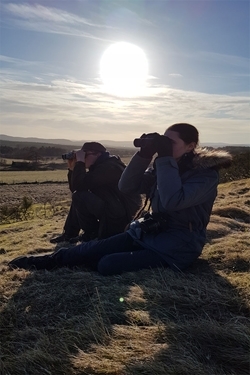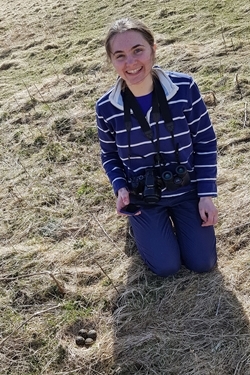The Game & Wildlife Conservation Trust (GWCT) is first and foremost a scientific research charity, investigating the problems faced by the UK’s game and other wildlife, and developing practical solutions. Our placement students, from universities across the UK, make a vital contribution to this work.
The GWCT demonstration farm’s placement students
 At our Scottish demonstration farm at Auchnerran, we employ two students each year. They help us with the multitude of projects running on the farm, which involve a lot of fieldwork. The students carry out basic survey work, which is vital in helping us monitor changes in the abundance of key species such as curlew, rabbits and red squirrels. This information can then be used to help inform management decisions by highlighting either positive or negative responses to our management decisions.
At our Scottish demonstration farm at Auchnerran, we employ two students each year. They help us with the multitude of projects running on the farm, which involve a lot of fieldwork. The students carry out basic survey work, which is vital in helping us monitor changes in the abundance of key species such as curlew, rabbits and red squirrels. This information can then be used to help inform management decisions by highlighting either positive or negative responses to our management decisions.
The students also help with more in-depth research projects like our wader tagging study. This involves fitting tags to individuals that then allow us to follow in great detail the birds’ movements, both on and off the farm. Although they are unable to tag the birds themselves as this requires a licence, the students are responsible for monitoring breeding attempts (finding nests and determining if the eggs hatch or not) and often summarising the gigabytes of data we get back from the tags.
Being based on the farm, our students get to see various aspects of farm management and help out from time to time with the sheep. All in all, their time at Auchnerran is an experience they value and thoroughly enjoy. One of our current students wrote a blog about what they’ve been doing.
Lowland placement students
 Students who work within the Scottish Lowlands team take part in a variety of projects at our demonstration sites in Fife and Midlothian. Most of their time is spent on the EU Interreg PARTRIDGE project, a demonstration project that aims to show farmers, policymakers and others that farmland wildlife can be increased by improving agri-environment schemes.
Students who work within the Scottish Lowlands team take part in a variety of projects at our demonstration sites in Fife and Midlothian. Most of their time is spent on the EU Interreg PARTRIDGE project, a demonstration project that aims to show farmers, policymakers and others that farmland wildlife can be increased by improving agri-environment schemes.
In order to measure biodiversity, our students assist with core surveys of our indicator species including brown hare, grey partridge (see video below taken by one of the students), breeding birds and many others. Although the project has had success already, including influencing agri-environment schemes in some of the countries taking part, there is still a lot of work to do in Scotland, and so the assistance of the students is essential for maintaining the rigorous survey programme and to help educate others about what the project is trying to achieve.
In addition to the PARTRIDGE demonstration project, the students also help to complete valuable research across our demonstration sites Balgonie and Whitburgh. These include investigating raptor populations, radio-tagging of grey partridges and using camera traps to determine species using the feeders provided at the demonstration sites. These surveys are crucial for providing data to research many different aspects of lowland environments. Recently one of our students wrote a blog about how much they are gaining from their time spent with the GWCT, which can be found here.
Not only does the GWCT benefit enormously from this relationship but the students learn lots of useful skills that will help in their future careers – skills that they can’t usually develop to the same degree at their host institution. The year they spend with us is highly informative, giving them a good practical grounding in many relevant techniques but also a far better understanding of the nuances of practical land management.